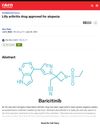
Search
for
Sort by
Research
30-60 / 953 results

research Mucocutaneous Manifestations of Endocrine Disorders
Skin symptoms can indicate endocrine disorders and have various treatments.

research Dermatologic Manifestations of Endocrine Disorders
Skin problems can be signs of hormone-related disorders and recognizing them early is important for treatment.

research Current Evaluation of Amenorrhea
Amenorrhea is relatively rare and initial testing should check FSH, TSH, and prolactin levels.

research Adrenal Disorders and the Pediatric Brain: Pathophysiological Considerations and Clinical Implications
Adrenal disorders can cause lasting brain and behavior issues in children.
research Localized Skin Hyperpigmentation as a Presenting Symptom of Vitamin B12 Deficiency Complicating Chronic Atrophic Gastritis
Vitamin B12 deficiency can cause skin darkening and other symptoms, which improve with B12 supplements.

research The Role of Androgens in Hormone Replacement Therapy
Androgen therapy can help with symptoms like low libido in women, but more research is needed to understand its long-term safety and effects on health.

research References

research Hot Topics in Pediatric Dermatology
Covers common skin issues in kids, their diagnosis, treatment, and need for specialist care.

research Lamivudine Associated Hair Repigmentation and a Comprehensive Review on Reversal of Canities
Lamivudine might reverse hair graying and needs more research for potential treatments.

research A Functional Polymorphism in Interleukin-1α (IL1A) Gene Is Associated with Risk of Alopecia Areata in Chinese Populations
A certain genetic variation in the IL1A gene may lower the risk of a hair loss condition in Chinese people.

research Practical Approaches to Medical and Cosmetic Dermatology in Skin of Color Patients
The document concludes that patients with skin of color need specialized dermatological care and education to manage unique skin conditions effectively.

research Current Evaluation of Amenorrhea
Amenorrhea, or the absence of periods, should be evaluated by age 15 or within five years of early breast development, and is most commonly caused by conditions like polycystic ovary syndrome and hypothalamic amenorrhea.

research Current Evaluation of Amenorrhea
Amenorrhea is when a woman doesn't have periods, with primary amenorrhea starting by age 15 or within five years of breast development, and secondary amenorrhea when periods stop for three months. It affects 3-4% of women not pregnant, breastfeeding, or in menopause, mainly due to polycystic ovary syndrome, hypothalamic amenorrhea, hyperprolactinemia, and ovarian failure.

research Alopecia
Hair loss in children can be caused by fungal infections, trauma, autoimmune disorders, or stress, and treatments vary depending on the cause.
research 22-Year-Old Male with Several Discrete Patches of Hair Loss
A 22-year-old man has alopecia areata, an autoimmune hair loss condition, with various treatments available.

research A Case of Alopecia Areata in a 27-Year-Old Filipino Male Treated With Peptides and Hyaluronic Acid Hair Filler
The document doesn't say if the treatment for hair loss worked.

research Potential Etiological Factors in Frontal Fibrosing Alopecia
The exact cause of frontal fibrosing alopecia is unknown, but it's not likely due to sunscreen.

research A Case of Hemi-Isaac's Syndrome
A man with Isaac's syndrome affecting only one side of his body improved after immune system-targeted treatment.

research Histopathology of Alopecia: A Clinicopathological Approach to Diagnosis
The conclusion is that accurate diagnosis of different types of hair loss requires good teamwork between skin doctors and lab experts.
research Alopecia Areata, Morphea, and Psoriasis: Clinical Features, Pathogenesis, and Treatment Options
Early diagnosis and treatment are crucial for managing alopecia areata, morphea, and psoriasis.

research Dual Improvement of Alopecia Areata and Immune Thrombocytopenia With Baricitinib: A Case Report
Baricitinib may effectively treat both alopecia areata and immune thrombocytopenia.

research Alopecia Areata: A Review on Diagnosis, Immunological Etiopathogenesis, and Treatment Options
The document concludes that while there are various treatments for Alopecia Areata, there is no cure, and individualized treatment plans are essential due to varying effectiveness.

research Autoimmune Skin Disorders
The document concludes that autoimmune skin disorders are treated with corticosteroids and immunosuppressive drugs.

research Lilly Arthritis Drug Approved for Alopecia
The drug Olumiant is now approved to treat severe hair loss from alopecia and can also be used for some hospitalized COVID-19 patients.
research Concurrence of Alopecia Areata and Vitiligo at the Same Anatomical Site
An 8-year-old boy had both alopecia areata and vitiligo on the same spot on his scalp, which is very rare.

research The Color of Skin: White Diseases of the Skin, Nails, and Mucosa
The document concludes that while white skin, nail, and mucosa diseases increase skin cancer risk, they are generally harmless, especially compared to darker pigmentation conditions.

research Prominent Follicular Mucinosis With Diffuse Scalp Alopecia Resembling Alopecia Areata
A woman's hair loss, resembling an autoimmune condition, improved after treatment, but requires ongoing checks due to potential serious associations.
research Simultaneous Onset of Alopecia Areata and Idiopathic Thrombocytopenic Purpura: A Potential Association?
A young girl had both alopecia areata and immune thrombocytopenic purpura at the same time, suggesting a possible link between the two.

research Large Doses of Glucocorticoid in the Treatment of Alopecia Areata
Large doses of glucocorticoids are not suitable for general use in treating severe alopecia areata due to inconsistent results and risks.